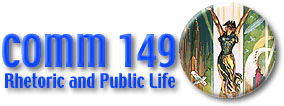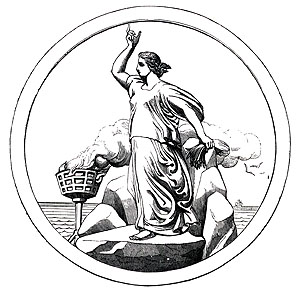
Office: HGH 210; phone: (408) 924-5378
Email: wooda@email.sjsu.edu
Web: http://www.sjsu.edu/faculty/wooda

|
Dr. Andrew Wood Office: HGH 210; phone: (408) 924-5378 Email: wooda@email.sjsu.edu Web: http://www.sjsu.edu/faculty/wooda |
 From the classical era to contemporary times, "the future" has provided a rhetorical locale to envision and critique public life. Texts range from the most banal of pulp fiction novels and advertising campaigns to the most sophisticated philosophical discourses. In these texts, the relationship between democracy and discipline becomes articulated in new and occasionally frightening ways.
From the classical era to contemporary times, "the future" has provided a rhetorical locale to envision and critique public life. Texts range from the most banal of pulp fiction novels and advertising campaigns to the most sophisticated philosophical discourses. In these texts, the relationship between democracy and discipline becomes articulated in new and occasionally frightening ways.
Building the world of tomorrow has been popularized in novels such as Edward Bellamy's Looking Backward, urban plans like Ebenezer Howard's Garden City, and the 'original' Tomorrowland of the 1939 World�s Fair. Yet, today, with its simultaneous emergence of urban militarism and nostalgic "planned communities," it appears to be more increasingly difficult to agree upon a singular definition of what tomorrow looks like, or whether we believe in tomorrow at all. Perhaps our lack of a unifying future can help explain why many Americans report a collapse of community in their daily lives.
In this course, we seek an enhanced knowledge of rhetorical theory and practice as they relate to democratic governance, social conflict, consensus, and public life. Drawing from a wide range of texts, we study how various entities - philosophical, religious, national, and corporate powers - have caused the public sphere to expand and contract through history. Our goal is to reveal and renew the struggle for community in a fragmenting world. The course concentrates on three areas of analysis:
Utopianism and the Ideal Community - We explore religious, literary, and political movements designed to provoke social change through their critique of existing frameworks and simultaneous invocation of new ways of living.
World's Fairs and Urban Design - We study the intersection of utopianism, nationalism, and consumerism that was prominent from the Victorian era through the mid-twentieth century. These fairs and cities enacted and contested notions of the ideal community.
Postmodern Modes of Community - We examine contemporary locales and practices of discipline, amusement, consumption, and desire that challenge traditional notions of progress and community.
Our objectives - Successful conclusion of this class means that you can: